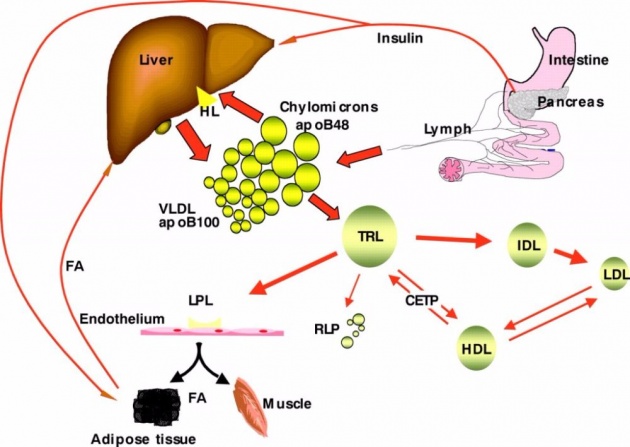
Good cholesterol, bad cholesterol, saturated fat, and unsaturated fat , sometimes it seems like you need a program to keep track of all the fat players in the story of heart disease. In some ways, triglycerides are the easiest to understand. Simply put, triglycerides are fat in the blood and are used to provide energy to the body. If you have extra triglycerides, they are stored in different places in case they are needed later. High triglyceride levels have been linked to a greater chance for heart disease. Just what your triglyceride levels mean and how much lowering triglycerides reduces heart disease risk is sometimes less clear.
What Are Triglycerides?
Triglycerides are important to human life and are the main form of fat in the body. When you think of fat developing and being stored in your hips or belly, you are thinking of triglycerides. Consider these things:
Triglycerides are the end product of digesting and breaking down fats in meals. Some triglycerides are made in the body from other energy sources such as carbohydrates. Triglycerides are measured using a common test called a lipid panel. It is the same blood test that checks "good" and "bad" cholesterol levels. The American Heart Association recommends that everyone over the age of 20 should get a lipid panel to measure cholesterol and triglycerides at least every five years. Triglyceride levels are checked after an overnight fast. Fat from a meal can artificially raise the triglyceride levels on the test.
What Are Normal and High Triglyceride Levels?
1) The National Cholesterol Education Program sets guidelines for triglyceride levels:
2) Normal triglycerides means there are less than 150 milligrams per deciliter (mg / dL).
3) Borderline high triglycerides = 150 to 199 mg/dL.
4) High triglycerides = 200 to 499 mg/dL.
5) Very high triglycerides = 500 mg/dL or higher.
High triglyceride levels may lead to heart disease, especially in people with low levels of "good" cholesterol and high levels of "bad" cholesterol, and in people with type 2 diabetes. Experts disagree, though, on just how bad of an effect high triglyceride levels by themselves have on the heart. Some of the confusion stems from the fact that high triglycerides have a tendency to appear with other risk factors. We do know that a low level of good cholesterol is a risk factor for heart disease. We also know that blood tests for triglycerides can show some variability. Many experts believe that high triglycerides may be a sign of other heart disease risk factors. That is, high triglyceride levels could multiply the bad effects of high cholesterol, high blood pressure, and diabetes. Some research also suggests that high triglycerides are a more important risk factor for women than for men, although this is also disputed. One point is clear, though: A healthy diet and exercise plan can lower triglyceride levels, improve cholesterol, and lower the risk of heart disease.
What Is the Treatment for High Triglycerides?
The main way to deal with high triglyceride levels is by eating a healthier diet and getting more exercise. Here are some guidelines to help you manage your triglyceride level:
1) 1) Moderate exercise on five or more days each week can help lower triglyceride levels.
2) Losing 5%-10% of your weight can lower triglycerides. People with a healthy weight are more likely to have normal triglyceride levels. Belly fat is associated with higher levels.
3) Reducing saturated fat, trans fat, and cholesterol in your diet can improve triglyceride levels and help manage cholesterol. Eating less carbohydrates in your diet will also help lower triglyceride levels.
4) Drinking alcohol can raise triglyceride levels. Some studies show that drinking more than one drink a day for women or two for men can raise triglyceride levels by a lot. Some people with high triglycerides may need to cut out alcohol entirely.
5) Eating more fish high in omega-3s can lower triglyceride levels. Fish like mackerel, lake trout, herring, sardines, albacore tuna, and salmon are high in omega-3s. It may be hard to get enough omega-3s from food to help lower your triglycerides. Your doctor may recommend a supplement or prescription omega-3s.
For some people with high triglycerides, medicine may be needed. The decision to treat triglyceride levels with drugs can be complicated because other health conditions are usually involved. Also, it is true that several medications can improve triglyceride levels:
1) 1) Fibrates such as Lopid, Fibricor, and Tricor
2) Nicotinic acid, also called Niaspan
3) High-doses of omega-3s are needed to lower triglycerides and should be taken only under a doctor's care. Epanova, Lovaza, and Vascepa are prescription forms of omega-3s.
4) By taking steps to improve your triglyceride levels, you will likely improve your overall health, fitness, cholesterol levels, and risk for heart disease.
Note: Do not take any medications on your own unless and until you consult you doctor.



